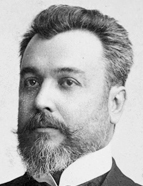

Francisco Xavier da Silva Teles, the "most illustrious representative of geographical science of his time in Portugal" (H. Lautensach), was responsible for incorporating geography into higher education.
A Goan by birth, Silva Teles was of Portuguese descent. He completed his elementary and high school education in his native Goa. In 1879, he travelled to the Metropolis to attend, initially, the Escola Médico-Cirúrgica do Porto [Porto Medical and Surgical School], later completing his studies in Lisbon before joining the Navy. As a naval doctor, Silva Teles visited some of Portugal's overseas provinces. He founded and led the Inhambane Hospital in Mozambique. Later, he would also help found the Instituto Bacteriológico do Hospital da Marinha [Bacteriological Institute of the Navy Hospital], as a result of the hygienists' concerns that prompted him to act and that he shared with Câmara Pestana, his colleague at the University.
The specialised training he received in Paris under Manouvrier accounts for his inclination towards climatology and hygiene studies, which—particularly in his roles as professor and director of the Escola de Medicina Tropical [School of Tropical Medicine]—he regarded as essential courses for the establishment of genuine "scientific colonisation", a concept he actively promoted at the Sociedade de Geografia de Lisboa [Lisbon Geographical Society]. It is from this conception that various works on the need for Higher Colonial Studies in Portugal were born and, in particular, the extensive report on A transportação penal e a colonização [Criminal transportation and colonisation], in which he demonstrates the judicial, demographic, and political ineffectiveness of the banishment sentences then in force in Portugal. In 1902, he began teaching at the School of Tropical Medicine, which he would also lead. He would go on to teach Geography at the Curso Superior de Letras [Higher Course of Letters], an institution that the Republic would later become the Faculdade de Letras [Faculty of Arts and Humanities] of the University of Lisbon. He also served as a professor of economic geography at the Instituto Superior do Comércio [Higher Institute of Commerce], established in 1911.
This work is financed by national funds through FCT - Foundation for Science and Technology, I.P, in the scope of the projects UIDB/04311/2020 and UIDP/04311/2020.
